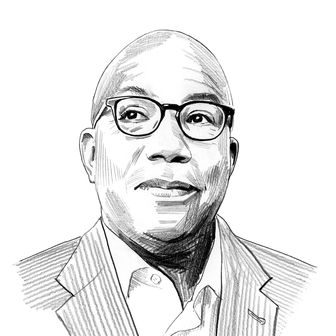
In the end, Kathy Hochul mounted a last-minute push, rallied the Democratic base, and attracted enough votes to become New York’s first elected woman governor — a victory so impressive that different factions of the party have already begun fighting over the political spoils.
The Working Families Party, which renewed its status as an official party by rounding up over 250,000 votes for Hochul on the WFP line, tweeted, “Now Hochul must respond to the call of voters and truly deliver for working New Yorkers.”
The best-known leader of the party’s progressive wing, Representative Alexandria Ocasio-Cortez, pointed to the loss of several congressional seats in the New York suburbs and called for the Democratic state chairman, Jay Jacobs, to be replaced.
“It’s no secret that an enormous amount of party leadership in New York State is based on big money and old-school, calcified machine-style politics that creates a very anemic voting base that is disengaged and disenfranchised,” Ocasio-Cortez told the New York Times. “Not once has the New York State Democratic chair ever called me. All he has done is antagonize myself and any progressive candidates.”
And a number of centrist Democratic lawmakers in southern Brooklyn are complaining that the state and local party failed to support them as a localized Republican surge cost several incumbent Democrats their seats. “Where the hell was the state party?” Senator Andrew Gounardes told The City. “We were literally left to die on a vine here. And it’s deeply frustrating that our party didn’t even put up a fight.”
As the newly crowned titular leader of the state Dems, Hochul will have her hands full keeping the party’s factions together in the weeks ahead — although the task will become considerably easier when she presents a $200-plus billion state budget in a few months. Nothing buys agreement among politicians quicker than the prospect of lining up cash, contracts, and jobs. Hochul now has the power to deploy all three.
But it’s important that Hochul not overlook the most important policy victory of the election: the resounding electoral defeat of Lee Zeldin’s much-hyped claim that crime is raging out of control and requires a top-to-bottom reworking of the state’s criminal-justice system.
Zeldin repeatedly pounded home the argument on the campaign trail, holding multiple press conferences at the scenes of horrific crimes, supported in full by the New York Post, which ran countless screaming front pages and blistering editorials claiming that the city is burning.
“This is the reality of life in Kathy Hochul’s New York. Vote like your life depends on it, because it does,” Zeldin tweeted a few days before the election, next to a Post front page depicting the suspect in a brutal rape on the west side of Manhattan. The same overwrought slogan — “your life depends on it” — was featured in Zeldin’s final, closing-argument campaign video.
Zeldin’s promised solution was to declare a state of emergency, suspend bail reform and other recently enacted laws, and initiate the removal of Manhattan district attorney Alvin Bragg.
The proposals themselves were questionable: A governor who summarily suspended laws would likely see his efforts immediately hampered or undone by the Democrats who hold nearly veto-proof majorities in both houses of the legislature. And the last time a governor successfully suspended a local elected law enforcement official was in 1932.
Legal questions aside, it seems that voters — including Zeldin’s own supporters — simply did not accept his premise that crime is an all-consuming battle that New York is losing.
An Associated Press survey of voters before and during Election Day shows that 40 percent of Zeldin voters considered crime the number-one issue they cared about; 64 percent said their leading concern was the economy.
It’s an easy mistake to make: Americans have a well-documented tendency to overestimate the risk that they, personally, will be the victim of a violent crime. Politicians often use those fears to fuel fearsome overreactions like the Rockefeller Drug Laws of the 1970s; the harsh three-strikes laws and prison-building spree of the 1990s; and New York’s explosion of sloppy, unconstitutional stop-and-frisk policing in the 2000s.
Media adds to the distorted perceptions: “You can have people perceiving areas of cities as much more violent than they actually are because that’s what they see in the news,” says one researcher. “It really amplifies that view of criminal activity beyond what it really is.”
Zeldin, the latest in a long line of politicians promoting crime as the number-one issue, missed the mark. Targeting Bragg, for instance, backfired; Zeldin’s team ignored the fact that Bragg had been elected less than a year earlier, winning 84 percent of the vote.
This time around, Manhattan voters in effect ratified that choice by supporting Hochul over Zeldin with 82 percent of the vote — the most lopsided outcome in any borough, giving Hochul 347,000 ballots, which is greater than her statewide margin of victory.
“Manhattan voters are astute, they’re smart, they know that of course we have public-safety challenges that we need to address, but they know we’re working on them every day,” Bragg told me the day after Zeldin conceded.
The DA says his team meets daily with members of the NYPD, other law enforcement and transit officials to target the most violent offenders in the borough. The strategy appears to be paying off: According to Bragg’s spokeswoman, murders in the borough are down 24 percent so far this year, faster than the 14 percent decline citywide.
Shootings are down 17 percent — better than the 15 percent decline citywide — and gun prosecutions are up 20 percent compared to last year.
There’s still plenty of room for worry — violent crimes like assault, robbery, and rape continue to rise, as do nuisance offenses like shoplifting and auto theft. But Bragg’s steady, focused attack on murders and shootings echoes Hochul’s own approach and matches her plea to the public to have patience while the professionals do their work.
That won’t put an end to the drumbeat of conservative voices with perpetual calls for more arrests and imprisonment. But Hochul can now say that the issue was aired, debated, and put to a vote. She can point out that the same voters who elevated her also elected big majorities of Democrats to the legislature, many of whom passed bail reform in keeping with their constituents’ wishes.
New Yorkers have chosen to settle in for the long haul and grind down crime day by day. To pretend otherwise would be a form of election denial.






























